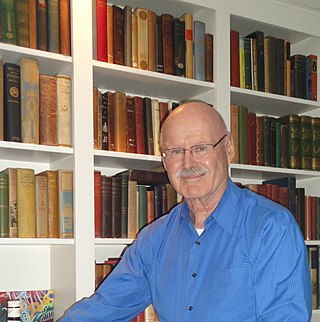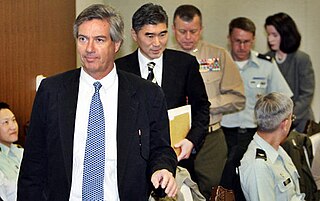
Samuel Phillips Huntington was an American political scientist, adviser, and academic. He spent more than half a century at Harvard University, where he was director of Harvard's Center for International Affairs and the Albert J. Weatherhead III University Professor.

Foreign Affairs is an American magazine of international relations and U.S. foreign policy published by the Council on Foreign Relations, a nonprofit, nonpartisan, membership organization and think tank specializing in U.S. foreign policy and international affairs. Founded on 15 September 1922, the print magazine is published every two months, while the website publishes articles daily and anthologies every other month.

The Council on Foreign Relations (CFR) is an American think tank specializing in U.S. foreign policy and international relations. Founded in 1921, it is an independent and nonpartisan 501(c)(3) nonprofit organization. CFR is based in New York City, with an additional office in Washington, D.C. Its membership has included senior politicians, secretaries of state, CIA directors, bankers, lawyers, professors, corporate directors, CEOs, and prominent media figures.
Michael W. Doyle is an American international relations scholar who is a theorist of the liberal "democratic peace" and author of Liberalism and World Politics. He has also written on the comparative history of empires and the evaluation of UN peace-keeping. He is a University professor of International Affairs, Law and Political Science at Columbia University - School of International and Public Affairs. He is the former director of Columbia Global Policy Initiative. He co-directs the Center on Global Governance at Columbia Law School.

Stephen David Krasner is an American political scientist and former diplomat. Krasner has been a professor of international relations at Stanford University since 1981, and served as the Director of Policy Planning from 2005 to April 2007 while on leave from Stanford.
Peter Bain Kenen was an American economist, who was the Walker Professor of Economics and International Finance at Princeton University, and senior fellow in international economics at the Council on Foreign Relations.

Robert Owen Keohane is an American political scientist working within the fields of international relations and international political economy. Following the publication of his influential book After Hegemony (1984), he has become widely associated with the theory of neoliberal institutionalism in international relations, as well as transnational relations and world politics in international relations in the 1970s.
Peter Joachim Katzenstein FBA is a German-American political scientist. He is the Walter S. Carpenter, Jr. Professor of International Studies at Cornell University. Katzenstein has made influential contributions to the fields of comparative politics, international relations, and international political economy.

The University of California, San Diego School of Global Policy and Strategy (GPS) is the graduate school of international affairs and public policy at the University of California, San Diego. It is a full member of the Association of Professional Schools of International Affairs, and awards Masters degrees in International Affairs (MIA), Public Policy (MPP), Chinese Economic and Political Affairs (MCEPA), a Master of Advanced Studies in International Affairs (MAS-IA) intended for mid-career professionals, and a Doctor of Philosophy in Political Science and International Affairs. The School also offers several five-year concurrent degree programs in cooperation with the International Studies Program and the Departments of Economics and Political Science.
Raymond F. Hopkins is an American political science professor and expert on food politics and food policy. Hopkins taught at Swarthmore College from 1967 until his retirement in 2007, where he was the Richter Professor of Political Science.
Richard Newton Rosecrance was an American political scientist. His research and teaching was focused on international relations, in particular the link between economics and international relations. His research and writing also touched upon the study of history. Rosecrance was an adherent of liberal international relations theory.

John Gerard Ruggie was the Berthold Beitz Research Professor in Human Rights and International Affairs at Harvard Kennedy School at Harvard University and an affiliated professor in international legal studies at Harvard Law School.

Beth A. Simmons is an American academic and notable international relations scholar. She is the Andrea Mitchell University Professor in Law, Political Science and Business Ethics at the University of Pennsylvania Law School. She is a former director of the Weatherhead Center for International Affairs at Harvard University and Clarence Dillon Professor of International Affairs at the Department of Government. Her research interests include international relations, political economy, international law, and international human rights law compliance.

Stephen M. Saideman is a political scientist who holds the Paterson Chair in International Affairs at Norman Paterson School of International Affairs at Carleton University in Ottawa, Canada. He has been the Canada Research Chair in International Security and Ethnic Conflict at McGill University, in Montreal. He has written four books as well as articles and book chapters. His work has focused on the international relations of ethnic conflict, and comparative civil-military relations.

Stephen J. Silvia is a professor at American University's School of International Service and an affiliate professor in American University's Economics Department. He teaches international economics, international trade relations, and comparative politics. He is a noted expert on the German economy, in particular, on German labor markets and industrial relations. He has written about comparative industrial relations, European Union economic policy, and comparative economic policy, with an emphasis on Germany and the United States.

Michael Craig Hudson was an American political scientist, the director of the Middle East Institute and professor of political science at the National University of Singapore. He was also professor emeritus at Georgetown University, where he was professor of international relations since 1979 and Saif Ghobash Professor of Arab Studies since 1980 in the Edmund A. Walsh School of Foreign Service. While at Georgetown, Hudson served as director of the Center for Contemporary Arab Studies intermittently for over twenty years, most recently from 2007 to 2010.

Sebastian Heilmann is a German political scientist and sinologist. He serves as the founding president of the Mercator Institute for China Studies (MERICS) in Berlin. Heilmann is a professor for the political economy of China at the University of Trier with many publications on China's political system, economic policy and international relations.

Jerrold D. Green is an American academician who is the Global Advisor to Cedars-Sinai, a Los Angeles based healthcare organization, and a Senior Fellow at the UCLA Burkle Center for International Relations. Prior to this he was President and Chief Executive Officer of the Pacific Council on International Policy and a Research Professor of Communication, Business, and International Relations at the University of Southern California. Green was a Partner at Best Associates in Dallas, Texas. He also occupied senior management positions at the RAND Corporation.

James Joseph Shinn is an entrepreneur, scholar, and former U.S. government official.














